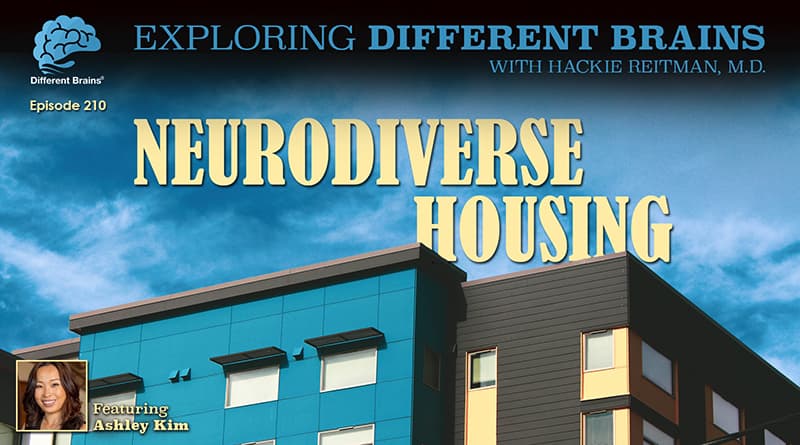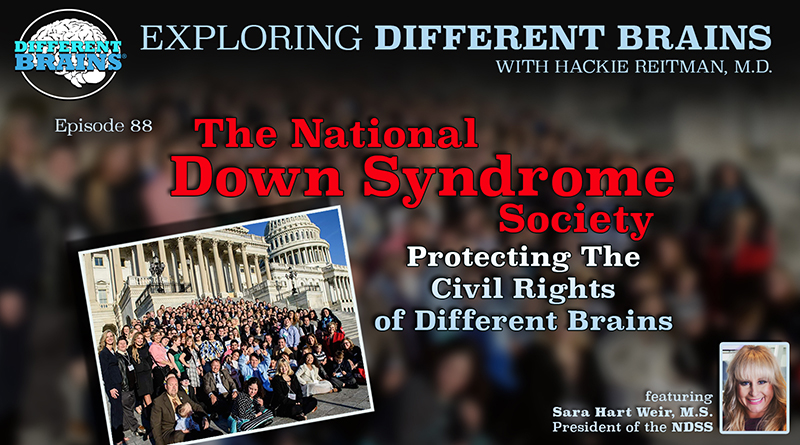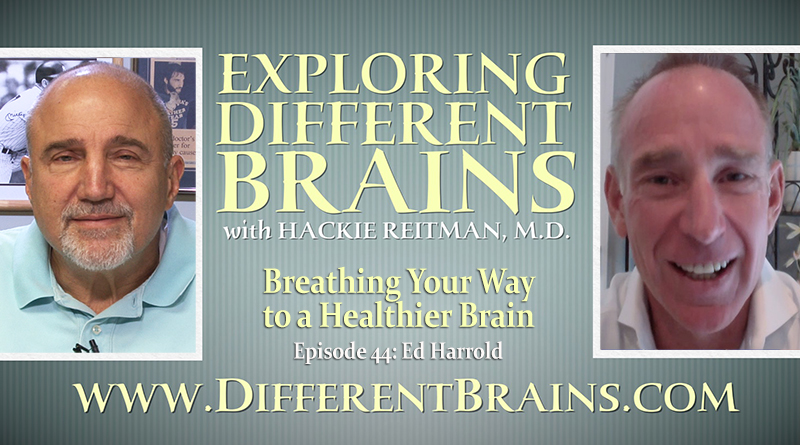Autism & Disclosure: Tips For Sharing Your Diagnosis, with Dr. Stephen Shore | EDB 219

Autism self-advocate, author, and professor Dr. Stephen Shore offers tips for disclosing a diagnosis.
(13 minutes) Dr. Stephen Shore is an autistic professor of special education at Adelphi University. He has written the books that include: College for Students with Disabilities, Understanding Autism for Dummies, Ask and Tell, and Beyond the Wall. Currently, he serves on the board of Autism Speaks, and is one of the first two autistic board members in its history, looking to improve the potential of those on the autism spectrum.
For more on Dr. Shore, visit: drstephenshore.com
AUDIO PODCAST VERSION:
Or look for us on your favorite podcast provider:
iTunes | Stitcher | SoundCloud
FULL TRANSCRIPTION
Dr. Stephen Shore Returns
DR HACKIE REITMAN (HR): Hi, I’m Dr. Hackie Reitman, Reitman, welcome to another episode of exploring different brains and today we’re welcoming back Professor Stephen Shore, who teaches at Adelphi University, one of the most terrific autistic self-advocates in all the land, Stephen Welcome back.
DR STEPHEN SHORE (SS): It’s my pleasure to be back, this is the third time I’ve been here and third time is a charm.
HR: One of the big stress factors for many is disclosure, disclosing I am Autistic, or I have Asperger’s, or I have ADHD but let’s talk about autism, What tips can you give us all about disclosure?
4 Steps of Disclosure
SS: Well, there’s two ways to look at disclosure. One is how do we tell an autistic person that they’re autistic in a way that’s meaningful to them that emphasizes the abilities and strengths. But at the same time, remains realistic, about the real challenges that autism can bring us. So that’s one type of disclosure. The other type of disclosure is when you have to tell somebody else that you’re autistic because there’s a need for better mutual understanding or perhaps better accommodation of some sort is needed. So let’s take a look at both of those. The first telling another person they’re like autistic, here’s an example of a child I started giving music lessons to the age of about 5 and 1/2 and he has Asperger’s Syndrome. His parents refuse to use the word; “Autism” in the house because they just knew with enough intensive activity, with early intervention that Asperger syndrome right out of him. Well, we fast forward to the teenage years and the kids as Asperger-ish as ever and his parents asked me if I would do the deed and I said well it’s a dirty job and John Wayne ain’t available so I guess gotta do it. So, we started the next lesson by talking about his strengths in music, graphic design and computers and we want to talk about the challenges that and this penmanship and physical education. So, that’s the first of the fourth step of this four-step approach that I use, recognizing strengths and challenges.
The second step is that you start lining them up on a piece of paper. Strengths on one side, challenges on the other. And let’s see if we can do to find a strength to accommodate or work around a challenge. So with this student, like me, he was a penmanship disaster area, but he was pretty good on the computer so maybe he should write all his papers using the computer and we thought that was a pretty good idea. And I might notice that I don’t use the word; weakness but, I use challenge because “weakness” is too static of a word, has too many negative connotations. Of the challenge that suggests that this is something that you can work through, around, over, accommodate for, even make a considered decision to just ignore the challenge and go on to do something else. So, for example, I know that I’m pretty low functioning in a noisy body. I also realize that I could wear ear protection, maybe I could take some magnesium, I heard that that could help with hearing sensitivities, I could learn more about non-verbal communication, or I could just decide that I could lead a fulfilling and productive life, without going into these establishments. So That’s what I choose.
Then there’s the third step, which I call “nonjudgmental” comparison. Look at other people’s characteristics and the ideas that different people have different characteristics, nobody’s better than anybody else and we use our strengths to lead fulfilling and productive lives. But I may touch in a couple of roll models, many people think bill gates is autistic and he seemed to do ok with his computer business. Then before presenting the label, which is step 4, to talk about scientists and doctors who study people’s characteristics. And it happens to be the earth’s set of characteristics line up with what is known as Asperger’s syndrome.
So, we’re 20 minutes into it, it was a very fastest disclosure. We said enough of this, can we get back to the lessons and we went on to the piano. Few weeks later, I asked his father, “how’d his son with his disclosure?” And dad said, “well my son loves having Asperger’s Syndrome”, So he got it and now he understands the way he is and knows where his challenges are and he can now effectively advocate for himself as needed because he can talk about what those challenges are.
Disclosing to Others
So, as we think about disclosing to another person is a big step process for that as well. Most of us disclose and with disclosure, it’s got to be a certain amount of advocacy as well. Although, I always wanted to tell somebody, so you’re advocating for somebody. So with that advocacy comes disclosure, with disclosure comes advocacy and those people advocate and disclose on their own without even thinking about it. Just comes naturally and suppose you lost and you have someone for directions get this whole verbal barrage of information you’re not going to remember it all. So you asked for a moment of time so they can get something to take it down. You do take it down and then you say okay thank you very much, now remember that all and you go on your merry way. So what you did is you engaged in this three step process automatically with one recognizing the challenge which is too much information, number two asking for some sort of accommodation bit of time to get out your iPad or whatever you going to take this information down on, and then finally you give a reason why. And you’re not going to remember it all.
Disclosing at Work
So, let’s put that more into an Artistic route and let us say I am being shown an open office for… by my supervisor. And this is where I’m going to work, it’s going to be a great place it’s pretty quiet for an open office so they won’t be in the auditorium issues so as I look about the room, I noticed that it’s lit with recessed lighting fixtures from the ceiling. Well they’re embedded in the ceiling. Well, one thing that autism means to me is the recessed lighting fixtures and I don’t get along. Being under one of those recessed lighting fixtures for me is probably like looking into a spotlight for most other people. So how do I address that? Well, many of you may think that its hat’s and facts statement and certainly, it’s good to support your home team with the big H there, Whenever possible. But in reality, it’s an accommodation and here it is, The bill. So that’s great. So that’s how I addressed that Issue.
So back to the employment situation being shown in office where I’m going to work that lit with recessed lighting features. So, I look about after recognizing this is going to be challenging to me and I engaged in step two which is the advocacy effort. Uh gee, I wonder if it’s ok if it’s ok if I wear a hat. The reason I need a hat — this is the disclosure — is because these lights hurt my eyes, I must have very sensitive eyes. And if I can wear a hat while I work, that will increase my productivity for your office, immeasurably. So, you throw something in that’s going to benefit your employer as well. So that was a very fast disclosure, just took a sentence or two. It was simple and it was something that the supervisor could easily provide which is permission to wear the hat. Doesn’t need to provide the hat. So that’s an example of self-advocacy and then disclosure, Will I have sensitive eyes? Which can be considered as a partial disclosure because I’ve just focused on the aspect of autism that’s affecting the situation right now as opposed to going full boat and talking about autism and maybe it being a distraction for the whole situation.
Student Disclosure
HR: What is the tip that you would give a high school senior about to enter college and that individual has a brain who’s a little bit different who might be on the spectrum?
SS: Well, I would…first, I would tell them that it gets better in college. So, if they can just hang on when they go to college, all the bullies would fall away and then find people, they’ll find their own crowd. Second thing I would do is to focus on developing a greater understanding of how autism affects them in school and be able to advocate for themselves for necessary accommodations.
HR: Well that second part gets very hard for individuals doesn’t it. To be able to self-identify and then ask for the accommodation.
SS: Right. However, at the university level, It’s quite a structured process and it begins with you going to the office of student disability. Sometimes it’s called office of student support or office of success or access office, whatever it is, you find that office and that’s where you start the process.
Societal Misconceptions
HR: Okay. What do you feel is one of the biggest misconceptions the general public has about autism?
SS: I would say that not wanting to socially interact is way up there. Because from what I know, of autistic people I know, most of them want to interact with others, most want to socialize. I think what has happened is it had so many bad experiences attempting to socialize in grade school that they’ve just given up in any desire or has been beaten out of us because most of the time attempting to socially interact is going to result in bullying and other bad things.
HR: How can people find out more about what you do, Stephen?
SS: Well, one way is to go to my website, Which is; www.dr.stephenshore.com. I also have a number of videos on YouTube, Facebook, and also my LinkedIn account.
Advice for First Time Disclosure
HR: What’s one piece of advice you would have for somebody who’s about to disclose for the first time?
SS: When you’re about to disclose for the first time, remember that your job is to educate the other person on how to better understand you.
HR: Well Stephen, It’s been a pleasure to have you here, good luck with all your teaching at Aldelphi and thanks for being a leader as a self-advocate and teaching autism, about autism, and how to help all of us. Thank you very much Stephen Shore.
SS: Well thank you.




